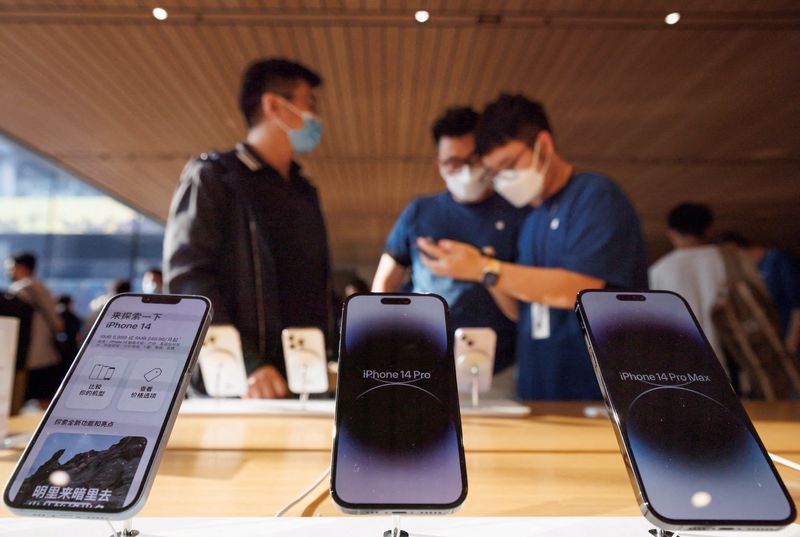China’s widening iPhone curbs roil US technology sector
2023.09.07 23:31

© Reuters. FILE PHOTO: A customer talks to sales assistants in an Apple store as Apple Inc’s new iPhone 14 models go on sale in Beijing, China, September 16, 2022. REUTERS/Thomas Peter/File Photo
By Aditya Soni and David Shepardson
(Reuters) -Beijing’s widening curbs on iPhone use by government staff raised concerns among U.S. lawmakers on Thursday and fanned fears that American tech companies heavily exposed to China could take a hit from rising tensions between the countries.
Apple (NASDAQ:) closed down 2.9% Thursday — its worst two-day percentage decline since November — after news that Beijing has told employees at some central government agencies in recent weeks to stop using their Apple phones at work.
Several Wall Street analysts said the curbs show that even a company with a good relationship with the Chinese government and a large presence in the world’s second-biggest economy was not immune to rising tensions between the two nations.
Sino-U.S. friction has worsened in recent years as Washington tries to restrict China’s access to key technologies including cutting-edge chip technology, and Beijing looks to reduce its reliance on American tech.
China’s Huawei last week launched its new Mate 60 Pro smartphone, which is powered by an advanced chip made by Chinese contract chipmaker SMIC and marks an apparent breakthrough for the duo hit by U.S. sanctions.
The U.S. Commerce Department said late Thursday it’s working to obtain more information “on the character and composition” of the chip that may violate trade restrictions.
“The restrictions in place since 2019 have knocked Huawei down and forced it to reinvent itself — at a substantial cost to the (Chinese) government,” the department added. “We are continually working to assess and, when appropriate, update our controls based on the dynamic threat environment and we will not hesitate to take appropriate action to protect U.S. national security.”
White House National Security Adviser Jake Sullivan told reporters on Air Force One the U.S. government is trying to get more information about the Huawei chip.
“There’s a number of different methods to try to sort of come to an understanding of what exactly it is that we’re dealing with here,” Sullivan said. “I can’t give you an exact number of days but this is not going to be months down the road. We’re going to want to look at this carefully, consult with our partners, get a clearer sense of what we’re looking at, and then we’ll make decisions accordingly.”
The U.S. sanctions cut Huawei’s access to chipmaking tools essential for producing the most advanced handset models, hammering the company’s business and allowing Apple to take some market share from the national favorite in China.
“If Huawei has the capability to supply and scale its home-grown Kirin 9000S (chips), we see the Mate series phone as an opportunity for Huawei to increase its shipments and regain its market share,” analysts at BofA Global Research said.
Apple supplier Qualcomm (NASDAQ:), one of the U.S. companies with the largest China presence, tumbled 7.2% to lead losses among major tech firms.
Lawmakers of both major U.S. parties have been vocal in their concerns about national security risks allegedly created by China’s products, pressuring the Biden administration to get even more aggressive with Beijing.
The wider ban is not surprising and shows how China is trying to limit a Western company’s market access to the nation, said U.S. Representative Mike Gallagher, the chairman of the House panel on China.
“This is textbook Chinese Communist Party behavior – promote PRC (People’s Republic of China) national champions in telecommunications, and slowly squeeze Western companies’ market access,” Gallagher, a Republican, told Reuters.
U.S. Senator Mark Warner, a Democrat and chair of the Senate Intelligence Committee, also shared similar concerns and said, “as the Chinese economy stalls, we can potentially anticipate more aggressive moves against foreign businesses”.
China has curbed shipments from prominent U.S. firms including planemaker Boeing (NYSE:) and memory chipmaker Micron (NASDAQ:).
Other suppliers of the iPhone maker including Broadcom (NASDAQ:), Skyworks Solutions (NASDAQ:) and Texas Instruments (NASDAQ:) were also lower, falling between 1.8% and 7.4%. The drop in the technology sector weighed on the three main U.S. stock indexes, particularly the tech-heavy , which closed down 0.9%.
“This announcement seems to have just refocused investors that the relationship between the U.S. and China is a big risk to current equity prices, particularly in technology,” said Rick Meckler, partner at Cherry Lane Investments.
IPHONE SLOWDOWN
China has been a bright spot for Apple in an otherwise tough period for iPhone sales.
“China is a crucial market for Apple, not just because it’s a super-important manufacturing hub, but because the country is an increasingly important source of revenues,” said Susannah Streeter, head of money and markets at Hargreaves Lansdown.
Apple gets nearly a fifth of its revenue from the country.
“Already rivals are closing the gap in high-end smartphone sales, and if the situation were to escalate this could potentially allow competitors to have a greater chance of stealing Apple’s crown,” Streeter said.
Apple could, however, see a demand boost after an event next week where it is expected to unveil its iPhone 15 line-up, as well as new smartwatches.








